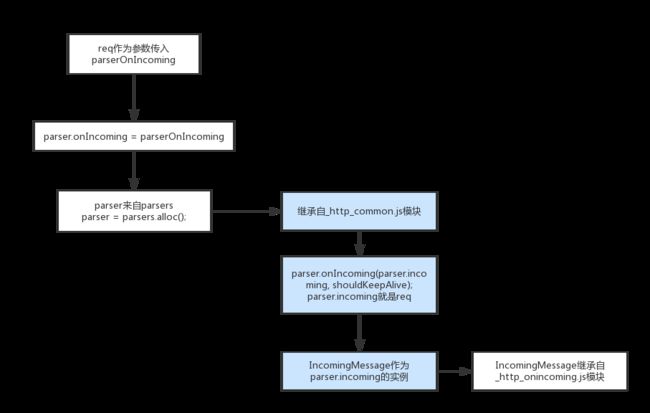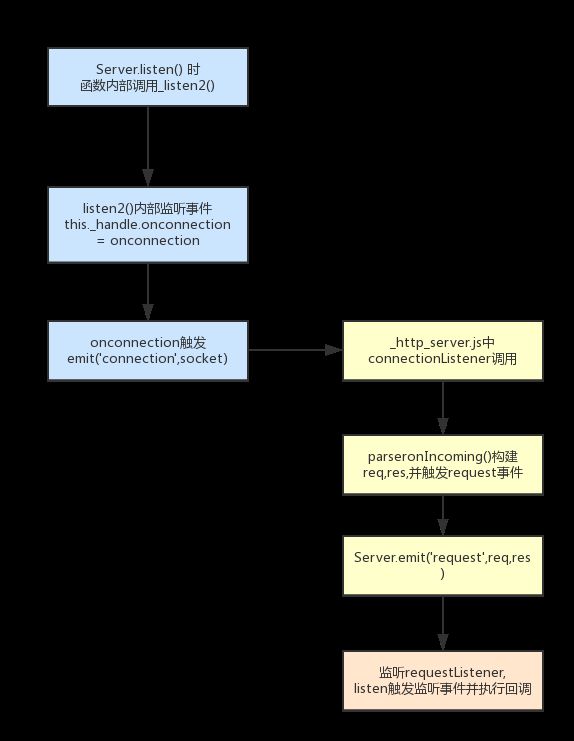NodeJS源码分析(2)【HTTP Server模块】
http是nodejs中重要的模块之一,有必要了解它的运行原理
回到helloworld ,当node在收到一个http请求,会创建一个http.Server,注册并监听request。
var http = require('http');
http.createServer((req, res) => {
res.writeHead(200, { 'Content-Type': 'text/plain' });
res.end('Hello World\n');
}).listen(port, hostname, () => {
console.log(`Server running at http://${hostname}:${port}/`);
});HTTP模块
- 打开node-v8.9.3/lib/http.js
首先引入的是http模块,模块抛出公共方法调用createServer实际上是返回Server实例,
createServer里面的回调函数(参数requestListener)
直接作为了Server的参数requestListener,而这个Server实际上是require(‘_http_server’)
'use strict';
const agent = require('_http_agent');
const { ClientRequest } = require('_http_client');
const common = require('_http_common');
const incoming = require('_http_incoming');
const outgoing = require('_http_outgoing');
//引入私有_http_server模块
const server = require('_http_server');
const { Server } = server;
//创建server, 将回调函数作为参数
function createServer(requestListener) {
return new Server(requestListener);
}
function request(options, cb) {
return new ClientRequest(options, cb);
}
function get(options, cb) {
var req = request(options, cb);
req.end();
return req;
}
//http模块暴露的所有公共方法
module.exports = {
_connectionListener: server._connectionListener,
METHODS: common.methods.slice().sort(),
STATUS_CODES: server.STATUS_CODES,
Agent: agent.Agent,
ClientRequest,
globalAgent: agent.globalAgent,
IncomingMessage: incoming.IncomingMessage,
OutgoingMessage: outgoing.OutgoingMessage,
Server,
ServerResponse: server.ServerResponse,
createServer,
get,
request
};打开文件node-v8.9.3/lib/_http_server.js 260行
实际上是为这个requestListener函数与’request’事件绑定到了一起,而’request ‘是方法parserOnIncoming里面抛出的一个事件
function Server(requestListener) {
if (!(this instanceof Server)) return new Server(requestListener);
net.Server.call(this, { allowHalfOpen: true });
//如果有回调函数,对当前实例进行监听,若request有事件触发则调用回调
if (requestListener) {
this.on('request', requestListener);
}
// Similar option to this. Too lazy to write my own docs.
// http://www.squid-cache.org/Doc/config/half_closed_clients/
// http://wiki.squid-cache.org/SquidFaq/InnerWorkings#What_is_a_half-closed_filedescriptor.3F
this.httpAllowHalfOpen = false;
//当启动server实例时,观察者建立connect事件
this.on('connection', connectionListener);
this.timeout = 2 * 60 * 1000;
this.keepAliveTimeout = 5000;
this._pendingResponseData = 0;
this.maxHeadersCount = null;
}
//net.Server继承Server
util.inherits(Server, net.Server);res过程?
调用emit方法,将request事件发送给每一个监听的实例,并且传入req,res
server.emit(‘request’, req, res); 这个事件也会同时抛出req和res两个对象
req变量与另一个叫做shouldKeepAlive的变量作参同时传入此函数parserOnIncoming
_http_server.js 592行 602行
//处理具体解析完毕的请求
function parserOnIncoming(server, socket, state, req, keepAlive) {
resetSocketTimeout(server, socket, state);
state.incoming.push(req);
// If the writable end isn't consuming, then stop reading
// so that we don't become overwhelmed by a flood of
// pipelined requests that may never be resolved.
if (!socket._paused) {
var ws = socket._writableState;
if (ws.needDrain || state.outgoingData >= ws.highWaterMark) {
socket._paused = true;
// We also need to pause the parser, but don't do that until after
// the call to execute, because we may still be processing the last
// chunk.
socket.pause();
}
}
//服务器通过ServerResponse实例,来个请求方发送数据。包括发送响应表头,发送响应主体
var res = new ServerResponse(req);
res._onPendingData = updateOutgoingData.bind(undefined, socket, state);
res.shouldKeepAlive = keepAlive;
DTRACE_HTTP_SERVER_REQUEST(req, socket);
LTTNG_HTTP_SERVER_REQUEST(req, socket);
COUNTER_HTTP_SERVER_REQUEST();
if (socket._httpMessage) {
// There are already pending outgoing res, append.
state.outgoing.push(res);
} else {
res.assignSocket(socket);
}
// When we're finished writing the response, check if this is the last
// response, if so destroy the socket.
res.on('finish',
resOnFinish.bind(undefined, req, res, socket, state, server));
if (req.headers.expect !== undefined &&
(req.httpVersionMajor === 1 && req.httpVersionMinor === 1)) {
if (continueExpression.test(req.headers.expect)) {
res._expect_continue = true;
if (server.listenerCount('checkContinue') > 0) {
server.emit('checkContinue', req, res);
} else {
res.writeContinue();
//送给每一个监听器的实例并传入req&res
server.emit('request', req, res);
}
} else if (server.listenerCount('checkExpectation') > 0) {
server.emit('checkExpectation', req, res);
} else {
res.writeHead(417);
res.end();
}
} else {
//送给每一个监听器的实例并传入req&res
// res实际上是ServerResponse的实例
// var res = new ServerResponse(req);
server.emit('request', req, res);
}
return false; // Not a HEAD response. (Not even a response!)
}ServerResponse 实现了 Writable Stream interface,内部也是通过socket来发送信息。
res,发现为ServerResponse()的实例并传入req
function ServerResponse(req) {
OutgoingMessage.call(this);
if (req.method === 'HEAD') this._hasBody = false;
this.sendDate = true;
this._sent100 = false;
this._expect_continue = false;
if (req.httpVersionMajor < 1 || req.httpVersionMinor < 1) {
this.useChunkedEncodingByDefault = chunkExpression.test(req.headers.te);
this.shouldKeepAlive = false;
}
}
//继承自OutgoingMessage,为OM的一个子类,所以回调函数里的res也是OM的一个实例
//来自_http_outgoing私有模块
//const OutgoingMessage = require('_http_outgoing').OutgoingMessage;
util.inherits(ServerResponse, OutgoingMessage);到此res线找到,res为ServerMessage的实例,也是OutgoingMessage的实例
function OutgoingMessage() {
Stream.call(this);
//返回一些与服务器有关的属性
// Queue that holds all currently pending data, until the response will be
// assigned to the socket (until it will its turn in the HTTP pipeline).
this.output = [];
this.outputEncodings = [];
this.outputCallbacks = [];
// `outputSize` is an approximate measure of how much data is queued on this
// response. `_onPendingData` will be invoked to update similar global
// per-connection counter. That counter will be used to pause/unpause the
// TCP socket and HTTP Parser and thus handle the backpressure.
this.outputSize = 0;
this.writable = true;
this._last = false;
this.upgrading = false;
this.chunkedEncoding = false;
this.shouldKeepAlive = true;
this.useChunkedEncodingByDefault = true;
this.sendDate = false;
this._removedConnection = false;
this._removedContLen = false;
this._removedTE = false;
this._contentLength = null;
this._hasBody = true;
this._trailer = '';
this.finished = false;
this._headerSent = false;
this.socket = null;
this.connection = null;
this._header = null;
this[outHeadersKey] = null;
this._onPendingData = noopPendingOutput;
}
util.inherits(OutgoingMessage, Stream); //继承自Stream 流程图演示:
req 过程
req,在parserOnIncoming()作为参数传入
parserOnIncoming()在哪里被调用?
// _http_server.js 345行
function connectionListener(socket) {
...
var parser = parsers.alloc();
parser.onIncoming = parserOnIncoming.bind(undefined, this, socket, state);
...
}parsers在_http_common.js抛出
onIncoming在skipBody = parser.onIncoming(parser.incoming, shouldKeepAlive)中调用
function parserOnHeadersComplete(...) {
...
//IncomingMessage的实例并将套接字作为参数传入 ,来自_http_common.js模块
parser.incoming = new IncomingMessage(parser.socket);
parser.incoming.httpVersionMajor = versionMajor;
parser.incoming.httpVersionMinor = versionMinor;
parser.incoming.httpVersion = `${versionMajor}.${versionMinor}`;
parser.incoming.url = url;
...
//onIncoming 这里被调用 parser.incoming相当于req
skipBody = parser.onIncoming(parser.incoming, shouldKeepAlive);
...
}Listen 过程
基于ner.js模块
Server Connection事件在net.Server.call(this, { allowHalfOpen: true })触发
connection会在onconnection中触发handle
function onconnection(err, clientHandle) {
var handle = this;
var self = handle.owner;
debug('onconnection');
if (err) {
self.emit('error', errnoException(err, 'accept'));
return;
}
if (self.maxConnections && self._connections >= self.maxConnections) {
clientHandle.close();
return;
}
var socket = new Socket({
handle: clientHandle,
allowHalfOpen: self.allowHalfOpen,
pauseOnCreate: self.pauseOnConnect
});
socket.readable = socket.writable = true;
self._connections++;
socket.server = self;
socket._server = self;
DTRACE_NET_SERVER_CONNECTION(socket);
LTTNG_NET_SERVER_CONNECTION(socket);
COUNTER_NET_SERVER_CONNECTION(socket);
self.emit('connection', socket);
}listen2调用setupListenHandle方法,注册onconnection
function setupListenHandle(address, port, addressType, backlog, fd) {
...
this._handle.onconnection = onconnection
...
}_listen2注册handle, 在listen里被调用
Server.prototype._listen2 = setupListenHandle;
server._listen2(address, port, addressType, backlog, fd);listen在Server原型上,所以在代码里的http.createServer()实例上有listen()方法
Server.prototype.listen = function(...args) {
...
if (options instanceof TCP) {
this._handle = options;
this[async_id_symbol] = this._handle.getAsyncId();
listenInCluster(this, null, -1, -1, backlogFromArgs);
return this;
}
...Socket.prototype.listen = function() {
debug('socket.listen');
this.on('connection', arguments[0]);
listenInCluster(this, null, null, null);
};

